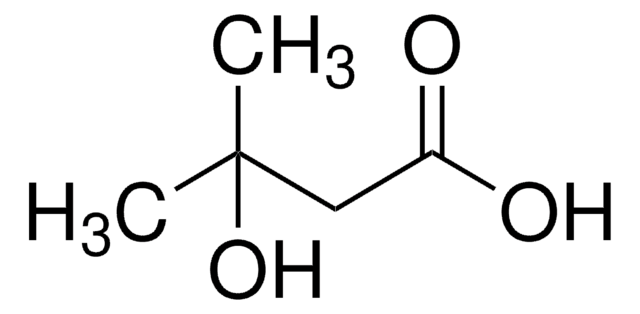04725
3-Hydroxyglutaric acid
analytical standard
Sinónimos:
β-Hydroxyglutaric acid, 3-Hydroxypentanedioic acid
Iniciar sesiónpara Ver la Fijación de precios por contrato y de la organización
About This Item
Fórmula empírica (notación de Hill):
C5H8O5
Número de CAS:
Peso molecular:
148.11
Beilstein/REAXYS Number:
1705476
MDL number:
UNSPSC Code:
12352106
PubChem Substance ID:
NACRES:
NA.24
Productos recomendados
grade
analytical standard
Quality Level
assay
≥95.0% (GC)
shelf life
limited shelf life, expiry date on the label
application(s)
clinical testing
format
neat
storage temp.
2-8°C
InChI
1S/C5H8O5/c6-3(1-4(7)8)2-5(9)10/h3,6H,1-2H2,(H,7,8)(H,9,10)
InChI key
ZQHYXNSQOIDNTL-UHFFFAOYSA-N
¿Está buscando productos similares? Visita Guía de comparación de productos
Biochem/physiol Actions
3-Hydroxyglutaric acid is a glutaric acid derivative which is the byproduct of glutaric acidemia type I. Glutaric aciduria type I (glutaryl-CoA dehydrogenase deficiency) is an inborn error of metabolism that usually manifests in infancy by an acute encephalopathic crisis and often results in permanent motor handicap. Studies indicate that 3-hydroxyglutaric acid can be used as biomarker for GCDH (glutaryl-CoA dehydrogenase) deficiency. It is believed that the excretion of 3-hydroxyglutaric acid is increased during ketosis, which occurs during glutaryl-CoA dehydrogenase deficiency. Studies on striatal cultures show that IGF-1 and FGF-2 (bFGF) reduces 3-hydroxyglutaric acid toxicity in striatal neurons.
Recommended products
Find a digital Reference Material for this product available on our online platform ChemisTwin® for NMR. You can use this digital equivalent on ChemisTwin® for your sample identity confirmation and compound quantification (with digital external standard). An NMR spectrum of this substance can be viewed and an online comparison against your sample can be performed with a few mouseclicks. Learn more here and start your free trial.
Storage Class
11 - Combustible Solids
wgk_germany
WGK 3
Elija entre una de las versiones más recientes:
¿Ya tiene este producto?
Encuentre la documentación para los productos que ha comprado recientemente en la Biblioteca de documentos.
Garfield A Simon et al.
Journal of chromatography. B, Analytical technologies in the biomedical and life sciences, 1097-1098, 101-110 (2018-09-16)
Glutaric aciduria type 1, a deficiency of glutaryl-CoA dehydrogenase, causes an accumulation of neurotoxic metabolites glutaric acid and 3-hydroxyglutaric acid (3-HGA). Testing of these analytes is routinely done by GC-MS but seldom account for interference from isomers or compounds with
K B Bjugstad et al.
Journal of inherited metabolic disease, 24(6), 631-647 (2002-01-05)
Glutaric acid (GA) and 3-hydroxyglutaric acid (3GA) are thought to contribute to the degeneration of the caudate and putamen that is seen in some children with glutaric acidaemia type I, a metabolic disorder caused by a glutaryl-CoA dehydrogenase deficiency. This
Gustavo C Ferreira et al.
International journal of developmental neuroscience : the official journal of the International Society for Developmental Neuroscience, 25(6), 391-398 (2007-07-24)
Glutaric acidemia type I is an inherited metabolic disorder caused by a severe deficiency of the mitochondrial glutaryl-CoA dehydrogenase activity leading to accumulation of predominantly glutaric and 3-hydroxyglutaric acids in the brain tissue of the affected patients. Considering that a
Paris Jafari et al.
PloS one, 8(1), e53735-e53735 (2013-01-18)
Glutaric aciduria type I (glutaryl-CoA dehydrogenase deficiency) is an inborn error of metabolism that usually manifests in infancy by an acute encephalopathic crisis and often results in permanent motor handicap. Biochemical hallmarks of this disease are elevated levels of glutarate
J Pitt et al.
Journal of inherited metabolic disease, 25(2), 83-88 (2002-07-18)
Three patients with ketosis had increased excretion of 3-hydroxyglutarate (21.8-37.9 micromol/mmol creatinine; controls 2.3 +/- 1.6), an indicator of glutaryl-CoA dehydrogenase deficiency (GDHD), which normalized when the patients were nonketotic. Clinical assessment of all three patients and enzyme studies in
Nuestro equipo de científicos tiene experiencia en todas las áreas de investigación: Ciencias de la vida, Ciencia de los materiales, Síntesis química, Cromatografía, Analítica y muchas otras.
Póngase en contacto con el Servicio técnico








